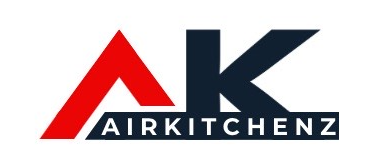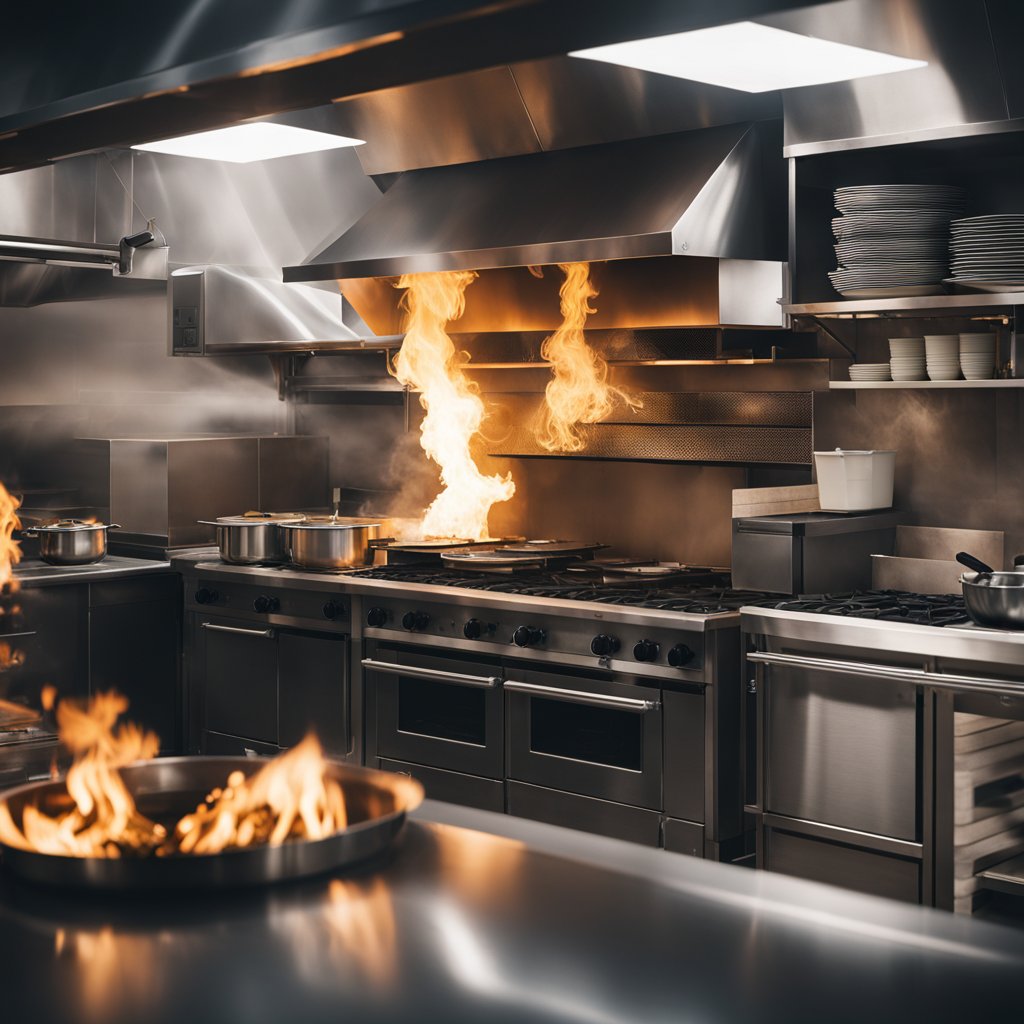We’re excited to introduce you to the always interesting and insightful Diego Leporini. We hope you’ll enjoy our conversation with Diego below.
Diego, thanks for joining us, excited to have you contributing your stories and insights. What’s the backstory behind how you came up with the idea for your business?
How I Came Up with the Idea for AirKitchenz
In 2017, I hit rock bottom. I had just closed my last brick-and-mortar restaurant, and I was flat broke, didn’t have a dollar in my pocket—just a passion for food and a determination to keep going. To survive, I started cooking out of my small apartment to fulfill catering orders, but I quickly realized that I needed a proper kitchen to scale. The costs, however, were overwhelming: tens of thousands of dollars for a build-out, endless bureaucratic hurdles, and all the risk that came with starting a food business from scratch. It felt impossible.
That’s when I had an idea: what if I could rent existing restaurant kitchens during their off-hours? I began knocking on doors, asking restaurant owners if I could use their kitchens. To my surprise, most said yes. They were struggling too, and the extra income was appealing. It was a simple arrangement that allowed me to grow my business without massive upfront costs. Over time, I realized I wasn’t just solving my own problem—I had stumbled upon a solution that could revolutionize the food industry.
The Problems We’re Solving
For Restaurants:
Problem: Independent restaurants are financially strapped, with most failing within two years due to high labor costs, rent, and operational expenses. Additionally, their kitchens sit idle for 40–60% of the day, representing wasted potential.
Solution: AirKitchenz turns downtime into opportunity. By renting out their underutilized kitchen spaces during off-hours, restaurants can generate passive income, effectively transforming from tenants into landlords. This new revenue stream can mean the difference between closing their doors or thriving.
For Food Entrepreneurs:
Problem: Starting a food business is prohibitively expensive, with high build-out costs, regulatory hurdles, and significant financial risk. This locks out aspiring entrepreneurs with great ideas but limited resources.
Solution: AirKitchenz provides a platform where entrepreneurs can find, book, and rent fully equipped restaurant kitchens on demand. This eliminates the need for costly build-outs and allows them to test, scale, and launch their businesses with minimal risk.
Why I Knew This Would Work
I lived both sides of the problem. As a restaurateur, I experienced firsthand how grueling the industry is and how tight margins are. As a food entrepreneur, I felt the frustration of being locked out of opportunities due to financial barriers. I knew the pain points intimately and realized that no one else was addressing them in a way that empowered both sides of the equation.
The logic was clear: underutilized kitchens were wasted assets, and food entrepreneurs were desperate for affordable access to commercial spaces. By connecting the two, we could create a win-win solution that didn’t just disrupt the industry—it redefined it. Our beta test proved the concept, generating over $110,000 in transactions in less than 45 days without any marketing spend. This validated not only the demand but also the scalability of our model.
What excites me most is that AirKitchenz isn’t just about solving logistical challenges—it’s about transforming lives. We’re giving struggling restaurants a lifeline and opening the door for food entrepreneurs to chase their dreams. It’s a mission I believe in deeply because I’ve lived it, and I know how much impact this can have.

Diego, love having you share your insights with us. Before we ask you more questions, maybe you can take a moment to introduce yourself to our readers who might have missed our earlier conversations?
My name is Diego Leporini, and I am the founder and CEO of AirKitchenz, a platform that revolutionizes how restaurant kitchens are utilized. My journey into the food industry began over 20 years ago as a chef and restaurateur. Over the years, I’ve opened more than 20 restaurants, catering businesses, and virtual dining concepts. This experience gave me a deep understanding of the challenges that food entrepreneurs and restaurant owners face daily.
The idea for AirKitchenz was born out of personal necessity and a clear market gap. After facing the tough decision to shut down one of my restaurants due to high costs, I found myself needing a commercial kitchen but without the resources to invest in one. That’s when I started renting underutilized restaurant kitchens during their off-hours, creating a flexible and affordable way to run my catering business. This firsthand experience revealed a win-win opportunity for both sides: restaurant owners could generate passive income, and food entrepreneurs could launch their ideas without the crippling costs of building their own spaces.
AirKitchenz provides a first-to-market, decentralized marketplace for renting restaurant kitchens during their downtime. We help restaurant owners transform their underutilized kitchens into revenue-generating assets and give food entrepreneurs access to fully equipped, ready-to-use commercial kitchens. It’s a solution that empowers two key groups in the food industry: restaurant owners looking for additional income streams and aspiring chefs and food businesses looking for low-cost, low-risk opportunities to enter the market.
What sets AirKitchenz apart is its simplicity and scalability. Unlike traditional ghost kitchens that come with high costs and rigid setups, our platform enables flexibility and collaboration. We’re leveraging technology to create a marketplace that connects people with solutions they didn’t even know were possible. It’s a concept that’s not only scalable but also transformative, with the potential to disrupt the food industry globally.
I’m most proud of how this platform bridges the gap between challenges and opportunities. Whether it’s helping a struggling restaurant owner stay afloat or enabling a small food business to take its first steps, the impact we’re making is tangible and meaningful.
For anyone considering working with us, supporting us, or simply following our journey, I want you to know that AirKitchenz is more than a business—it’s a mission to reshape the food industry. We’re creating a world where no kitchen sits idle and where dreams of starting a food business are accessible to everyone.
Can you share a story from your journey that illustrates your resilience?
Lessons Learned from a Near-Death Business Experience
When reflecting on my journey in the food business and why we’re building what we are today with AirKitchenz, I often think back to my past experiences. I’ve opened and been involved with 26 restaurants—some were mine, others I managed, worked in as a chef, or consulted for. These experiences taught me that the restaurant business is one of the toughest industries out there.
The challenges are immense:
High costs: Food, labor, and rent are all extremely expensive.
Long leases: Most commercial leases lock you in for 5-10 years, making it nearly impossible to get out without severe financial consequences.
Statistically, 80% of restaurants close within two years, and that number has mirrored my own experience. Out of the 20+ restaurants I’ve opened, only about 3 or 4 are still operating today.
One story stands out because it reflects the harsh realities of bad partnerships and the importance of protecting yourself.
The Bad Partnership Story
In one of my restaurant ventures, I partnered with individuals who were 30 years older than me and completely out of touch with how businesses operate today. Initially, I thought their experience would be an asset, but it turned into a nightmare. I owned 30% of the business, but they continually restructured the partnership, taking more control and eventually deciding that my name would not even be included on the corporation. This happened after they had already taken my money and I had invested significant time building the restaurant from the ground up.
Looking back, I should have seen the red flags:
Changing partnership terms: They kept revising the structure to reduce my influence.
No access to finances: They refused to give me access to the bank accounts or financial reports.
Premeditated actions: It became clear they had planned to use me to build the restaurant while shielding me from any real control.
The most shocking part came when I discovered they were using the restaurant’s funds to pay for payroll at their other failing businesses. They even had a secretary complicit in covering everything up.
The moment of realization happened when I was handed payroll checks with names I didn’t recognize. Upon investigating, I uncovered the truth: they were using our restaurant to fund their other ventures. When I confronted them, they denied everything and continued to block me from accessing any financial records.
The Fallout
Eventually, I had to file a lawsuit to get justice. It was a grueling process, but in the end:
They were forced to pay for their actions.
I exited the business, protecting myself from further losses.
The restaurant they tried to control fell apart and eventually closed.
This experience taught me a hard lesson about trust and partnership in business.
Key Takeaways
Choose your partners wisely: Partnerships can make or break your business. Do your due diligence before entering any agreement.
Protect yourself: Always demand transparency and access to financials, even if others push back.
Trust but verify: Never blindly trust anyone, no matter how experienced or well-connected they may seem.
Red flags matter: If something feels off—like constantly changing terms or lack of transparency—don’t ignore it.
This experience is one of many that shaped me and inspired the creation of AirKitchenz. We aim to eliminate many of the risks I faced, offering entrepreneurs a way to enter the food business without the crushing costs and challenges of traditional restaurant ownership.
Business is tough, but resilience and hard-earned lessons pave the way forward.

Any advice for managing a team?
Advice for Managing a Team and Maintaining High Morale
Managing a team, especially in a startup at the early stages, comes with unique challenges but also incredible opportunities. Here’s how I approach it with my team at AirKitchenz:
1. Embrace Remote Work and Collaboration
As a startup, we operate entirely remotely. Everyone on the team is working without pay for now, as we’re actively fundraising. Despite these challenges, we’ve built a system to stay connected and aligned:
Daily Communication: We use Slack to stay in touch and ensure everyone knows their tasks.
Wearing Multiple Hats: Each team member is involved in various aspects of the business, which fosters a deeper understanding of our goals and challenges.
2. Build a Team that Believes in Your Vision
Our team was built from scratch—mostly through LinkedIn. I shared my vision for the company and its potential, and I was fortunate to find talented individuals who saw the same possibilities.
In just six months, we’ve built a platform, started beta testing, and are preparing to bring the product to market.
The key is helping your team understand the why behind the business. Why are we doing this? What problems are we solving? What impact will this have on the market?
When people believe in the mission, they’re motivated to give their best, even when resources are limited.
3. Encourage Involvement and Open Communication
One of my biggest priorities is involving the team in all aspects of the business. Whether it’s fundraising, acquiring clients, or refining the platform, every team member—regardless of their role—has a voice.
Ten Heads Think Better Than One: Great ideas can come from anyone, even those with less experience in a particular area.
Avoid Blind Spots: Being deeply involved in the business can make you miss obvious solutions. Your team can provide fresh perspectives you might not see.
For example, even our engineers, who are highly technical, are involved in brainstorming ways to attract clients, secure kitchen listings, and connect with investors. Their ideas and input are invaluable.
4. Show the Team Their Value
People stay motivated when they feel their contributions matter. I always encourage my team to share their ideas and suggestions, and I make sure they know their input is valued:
Even if an idea isn’t implemented immediately, giving team members the space to express themselves builds trust and morale.
Recognizing their contributions and showing that you genuinely care about their input creates a positive, motivated culture.
5. Be Transparent and Accessible
As a founder and CEO, I believe in leading by example. My team knows:
I’m accessible at all times for questions, ideas, or support.
I’m upfront about the challenges we face, the progress we’re making, and the vision we’re working toward.
I work hard to ensure my team knows what I’m doing daily to push the company forward. Whether it’s waking up at 3:30 AM to juggle two full-time jobs or attending meetings with potential investors, they see my dedication, and that inspires them to stay committed.
6. Keep the Big Picture in Focus
I remind the team regularly that what we’re building has the potential to scale nationwide and globally. At this stage, our core team is the most important asset we have.
I want my team to grow with me, and they know that their contributions today are laying the foundation for something extraordinary.
Maintaining this connection is critical. If team members feel disconnected or think you’re not accessible, they’ll lose interest.
Final Thoughts
Managing a startup team requires more than delegation; it requires building trust, fostering collaboration, and showing genuine appreciation for each person’s role.
The success of a startup depends on its core team, especially in the early stages. I’ve worked incredibly hard to build the team I have now, and I’m committed to growing with them and creating a business we can all be proud of.
When your team believes in the vision, feels valued, and knows they’re making an impact, they’ll stay motivated—and that’s how you build something great together.
Contact Info:
- Website: https://AirKitchenz.com
- Instagram: https://www.instagram.com/airkitchenz/
- Facebook: https://www.facebook.com/AirKitchenz
- Linkedin: https://www.linkedin.com/company/102052984/admin/dashboard/
- Twitter: https://x.com/AirKitchenz


